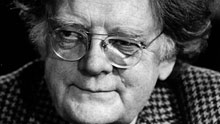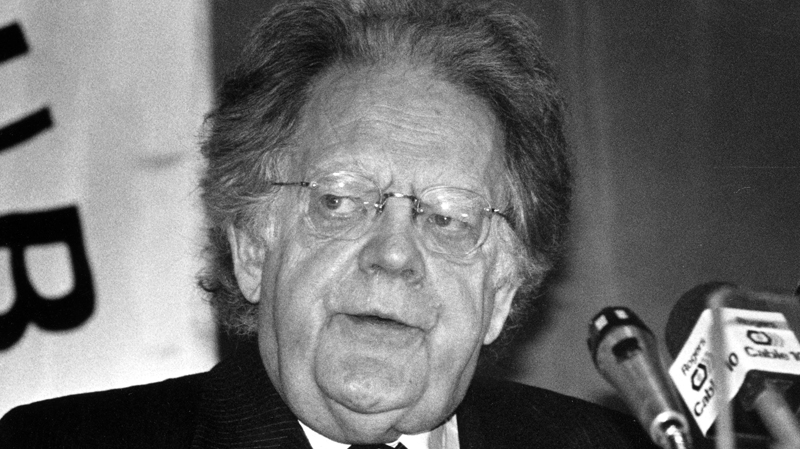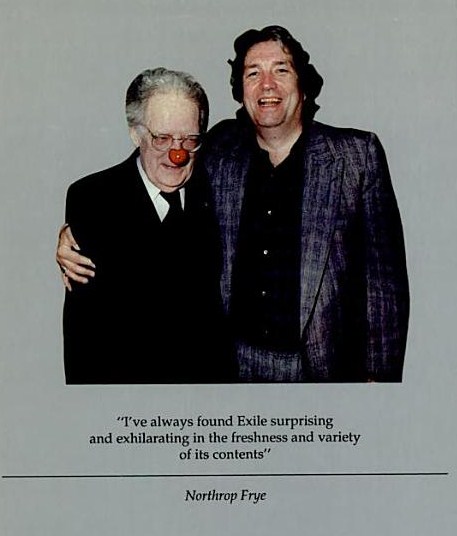
The CBC has put up an online poll asking if the RCMP was justified in spying on Frye. Twenty percent of respondents have said yes. It’s not hard to guess who these people are.
(Photo: Canadian Press; h/t Clayton)

The CBC has put up an online poll asking if the RCMP was justified in spying on Frye. Twenty percent of respondents have said yes. It’s not hard to guess who these people are.
(Photo: Canadian Press; h/t Clayton)

The Canadian Press has turned up the RCMP’s covert dossier on Frye. The only reassuring thing about it is the comical stupidity of the investigators:
Canada’s intelligence service spied on renowned literary scholar Northrop Frye, closely eyeing his involvement in the anti-Vietnam War movement, an academic forum on China and efforts to end apartheid in South Africa.
Newly released archival records show the RCMP Security Service relied on a secret informant to help compile a 142-page file on the esteemed University of Toronto professor, who died in 1991 at age 78.
Every inch the owlish, bespectacled academic, Frye seems an unlikely counter-intelligence target.
But the Mounties, wary of anyone deemed influential among the burgeoning New Left, amassed hundreds of thousands of files during the Cold War — monitoring key institutions such as universities, the media, churches and political organizations.
The scandal-ridden RCMP spy agency was disbanded in 1984 and replaced by the civilian Canadian Security Intelligence Service.
The Canadian Press obtained the intelligence dossier on Frye from Library and Archives Canada under the Access to Information Act. RCMP files on individuals can be disclosed only 20 years after the person’s death.
The material covers the years 1960 through 1972, after Frye had forged a reputation as one of the pre-eminent western intellectuals.
Several pages of the Frye file — though close to half a century old — were completely withheld from release because they contain personal information about others or material still deemed sensitive to Canada’s security.
*
The Mounties seemed to first take note of Frye in 1960, when he served as a sponsor of the Toronto Disarmament Committee. In 1963, the RCMP flagged Frye’s participation — along with luminaries including communications theorist Marshall McLuhan and political scientist C.B. Macpherson — in the planned Norwegian quarterly Co-existence.
A three-page March 1967 memo detailed Frye’s biographical details, relying on a secret source for information about his wife.
The investigator noted Frye “has come to our attention” on a number of occasions, including involvement in a letter questioning Canada’s complicity in the Vietnam conflict, and his role on the honourary board of an international educational forum — or “teach-in” — on China at the University of Toronto in 1966.
“Our source felt his participation gave the Teach-in a note of credibility,” says the RCMP memo.
*
The 1967 biographical memo, prepared by an RCMP constable, reveals that at least one thing stumped the spies.
“At the present time, we are unable to ascertain what the initial ‘H’ stands for in Frye’s name.”
*
Though he took a progressive stand on issues of the day, including the battle against racial segregation in South Africa, Frye expressed skepticism about the left-wing student movement flowering on campuses in the ’60s.
He told a convocation address in Wolfville, N.S., in 1969 that demonstrations would soon wither away, with little to show for the marches and placard-waving.
The next month he would write in a Toronto newspaper column, collected in his RCMP file, that many forms of social action, “on the campus and off it, are either purely symbolic or forms of private enterprise that show a touching belief in advertising and publicity stunts.”
(Photo: The Canadian Press)
http://www.youtube.com/watch?v=-E4FRtrD9aQ
The Beach Boys, “Wouldn’t it Be Nice”
Sorry. This post should have gone up last Sunday on a timer, but I set it wrong. My disappearance was just some much-needed time off. After keeping the blog every day for two years, I was in need of a break — a getaway, as it turns out.
We’ll be posting intermittently rather than daily over the next little while, and perhaps take a full two weeks off in the middle of August.
That doesn’t mean there’s nothing going on behind the scenes. We’re giving our library and journal a major upgrade, which will make them more user-friendly. We think you’ll be pleasantly surprised.
We will also be adding a new full-length work, a major addition to Frye scholarship. We know you’ll be pleasantly surprised by that too.
In the meantime, as we approach our second anniversary, we are asking for your feedback. This year is the lead up to the Frye centenary, and we of course are looking to make our own contribution, however modest. The first thing to do, therefore, is to find out how we might do it better. Your comments and suggestions are welcome.
Our readership is strong and we hope as we enter our third year it will get stronger. However, I’m assuming that a good portion of that readership has slipped into the wholesome recreations of summer. Enjoy. Peek in on us now and again, and we’ll see you fully up and running in September.
http://www.funnyordie.com/videos/44801db035/mom-jeans
In a recent column in The New Yorker, Susan Orlean wondered “why mom jeans?” She can provide the why. The how and the when, however, come, once again, from SNL, and the familiar cohort of Tina Fey, Amy Poehler, Maya Rudolph and Rachel Dratch.
http://www.youtube.com/watch?v=3-GEAgSFwyE
It’s Frye’s birthday week, and posting a movie he’d seen and enjoyed is a good way to go.
Although I want to say this first. There is almost no video and audio of Frye available online. The CBC is sitting on a treasure trove of interviews and features. A few months ago, TVO posted a link to a Frye interview from the 1970s-era “Education of Mike McManus,” but the link was dead. I wrote TVO about it, was promised the link would be fixed, and then it disappeared altogether.
Now that the centenary is on the way, people should weigh in and convince these public institutions to make this material available. There’s stuff everywhere on Marshall McLuhan (whose centenary is on 21st), including YouTube. There is potentially a lot of audio and video of Frye that could be had from many sources. We should be able to access it.
Now this movie, Whisky Galore!, is a classic from Ealing Studios, which made smart little British comedies during the 1950s. Frye saw it under the title, Tight Little Island, which was the name attached to it for North American release. Frye records seeing it and makes an extended comment on it in his 1950 diary, a time we now know the work that eventually became Anatomy of Criticism was gestating. It really shows in this comment:
The show itself was pleasant: “Tight Little Island,” about a small Hebridean community & how it dealt with a wreck bearing fifty thousand cases of whisky. An immemorial theme, but pleasantly handled. As I was looking for comic archetypes, I noted that the Saturnalia is an upsetting of an existing social order which recalls a Golden Age before that order was established, & which is therefore the Saturnalia’s grandfather, so to speak. Hence the existing social order is a kind of deputy rule, a viceregent custom, like the rule of Angelo in MM [Measure for Measure]. In this movie the only antagonist, a Malvolio churl, was captain of the home guard, & tried, like Malvolio, to act like a steward locking up the drinks. One of the most unsympathetic people was his own colonel. This, of course, was as corny as Plautus himself really: the drunks weren’t slaves, but they were poor people, & there was a restive agin-the-government tone to the whole picture. (CW 8, 312-13)
Part of the evolution of the universe sequence in The Tree of Life
Over the last little while we’ve been running a Frye on God thread, which has already become part of a skein that weaves together a number of themes, not all of them obviously related.
In a post yesterday we had a look at Job, who seems to get us closer to a notion of God that consolidates these apparent incongruities. So let’s see how much further Job’s God can take us. From Words with Power:
The mysteries of birth and death. . .can never be understood because they can never be objectified. But there is a creation that mystifies and a creation that reveals, and the latter is identical with the former. Except that the mysterious creation, the one infinitely far back in the past, is the one that Job has heard about but cannot directly see (42:5). When the infinitely remote creation is re-presented to him, he becomes a participant in it: that is, he become creative in himself, as heaven and earth are made new to him. He is given no new discovery, but gains a deeper apprehension of what is already there. This deeper apprehension is not simply more wisdom, but an access of power.
Myths of a paradise lost in the past or a hell threatening us after death are myths corrupted by the anxieties of time. Hell is in front of us because we have put it there; paradise is missing because we have failed to put it there. The Biblical perspective of divine initiative and human response passes into its opposite, where the initiative is human, and where a divine response, symbolized by the answer to Job, is guaranteed. The union of these perceptions would be the next step, except that where it takes place there are no next steps (CW, 264-65).

Jon Stewart takes on homophobic presidential candidate Michelle (“Gays are a part of Satan”) Bachmann’s equally homophobic husband, Marcus Bachmann, who runs a “clinic” to help “pray the gay away” but leaves the impression that he protests a little too much. It is a pattern that is familiar enough by now: closeted men on the Christian right who repress their sexuality, which then manifests as hostility toward openly gay people — including efforts to “cure” them through Bible-based “reparation therapy.”
In a nice meta-comical turn, Stewart recruits Jerry Seinfeld to counsel him on how to repress his urges to make jokes about a man who may be repressing urges of his own.
You can watch the video here.
Gay activist and author Dan Savage provides some perspective:
Straight people haven’t just gotten used to gay people—to openly gay people—they’ve come to the realization that they prefer openly gay people to lying closet cases. They would rather have a beer with an honest Cam than a glass of champagne with a lying Liberace. And that’s why Marcus Bachmann is being ridiculed: it’s not because he’s perceived to be gay—it’s not because he pings on everyone’s gaydar save Michele’s—it’s because he’s perceived to be dishonest. He appears to be a lying closet case, a lying closet case who’s made convincing other gay people to join him in the closet his life’s work. And straight people don’t like being lied to.
The reason for the links above relating to the implications of homophobia, by the way, is that the response on the right has been to dismiss all of this as stereotyping. However, home truths about homophobia turn out to have both a public record and a scientific basis.
http://www.youtube.com/watch?v=WXRYA1dxP_0
I saw The Tree of Life last night, and it is a remarkable film. I loved all 14 billion years of it. (Yes, it does stretch back to the creation of the universe, but with emphasis on the last 60 years.)
There are two explicit references to the Book of Job, beginning with the opening title card, which refers to God’s confrontation with Job where God asks in the midst of Job’s terrible suffering what he knows about the origins of creation: “Where were you when I laid the foundations of the earth. . .when the morning stars sang together?” (38:4,7). The entire movie is keyed to this reference, which even then may not fully penetrate the mood of mystery whose motifs seem to be never-ending rounds of love and loss.
Frye, of course, wrote extensively about the Book of Job — about this climactic confrontation between God and Job especially — and, not surprisingly, offers clarification. From The Great Code:
The fact that God’s speech is thrown into a series of rhetorical questions to which “no” is the only answer seems to give it a bullying and hectoring quality, and certainly there is no “answer” to Job’s problem. But did we ever seriously think that so great a poem would turn out to be a problem with an answer? To answer a question. . .is to accept the assumptions in it, and thereby to neutralize the question by consolidating the mental level on which the question was asked. Real questions are stages in formulating better questions; answers cheat us out of the chance to do this. So even if we are dissatisfied with God’s performance, a God who was glibly ready to explain it all would be more contemptible than the most reactionary of divine bullies.
We remember that Job himself was groping toward a realization that no causal explanation of his alienated plight was possible. In a sense God is speaking out of Job’s own consciousness here: any causal explanation takes us back to a First Cause, that is the creation. The rhetorical questions really mean, then, in this context: don’t look along the line of causes to the creation: there is no answer there, and no help there. How Job got into his position is less important than how he is to get out of it; and it is only because he was not a participant in creation that he can be liberated from the chaos and darkness within it. (CW, 217-18)

Frye and Barry Callaghan on the back cover of Callaghan’s memoir, Barrelhouse Kings.
Today is Frye’s 99th birthday, which means we’re in the run-up to what will undoubtedly be an eventful centenary.
Looking back at our posts for Frye’s 98th birthday on July 14, 2010, we’re reminded what a busy and eventful time it was.
First of all, it occurred during a rising storm of protest after the University of Toronto announced the closing of the Centre for Comparative Literature, which was founded by Frye. The closure was eventually cancelled, in large part through the efforts of highly dedicated people, like our own Jonathan Allan. Our first post of the day, therefore, was a letter from Bob Denham to U of T President David Naylor, offering support for the Centre.
Next up was a compilation of birthday entries from Frye’s personal diaries, as well as many more letters to his fiance, Helen Kemp, covering the period 1932 to 1950; and, finally, selections from his notebooks at the other end of his life.
There then followed a post about the legacy and continuing importance of the Centre for Comparative Literature from Jonthan Allan.
Then came an update from Dawn Arnold of the Frye Festival on the competition for funding of a community project. Moncton’s proposal was to raise a statue of Northrop Frye to sit in front of the Moncton Public Library, an institution Frye worked for in his youth. The bid did not succeed, but it was very close. I remain hopeful that, with the centenary approaching, the good people of Moncton will somehow get their wish.
That was followed by a birthday greeting from reader Tamara Kamermans, in the form of a novelty video of the Beatles playing “Birthday.”
Finally, a post to round out an eventful day: an announcement that the website was now on Facebook, and a further announcement of a new addition to our journal, a paper by Ken Paradis.
This is a good time to remind readers that we have a dedicated category, Call for Papers, which includes solicitations related to the centenary. We also have a separate category, Frye Centenary, which we expect will fill with more content as the year progresses.
There’s obviously a story attached to the wonderful photo above, and you can read it after the jump. As it was Alice Munro’s 80th birthday the other day, it’s nice that she appears in it too, along with a number of other Canadian luminaries.
Prime Minister David Cameron says Murdoch’s withdrawal of a bid for BSkyB is “the right decision for the country”
The wave of anger that threatens to swamp the cynical commercial interests of News Corp. — and Rupert Murdoch more specifically — is presciently characterized in Frye’s essay, “Communications,” published in 1970:
All the mass media have a close connection with the centres of social authority, and reflect their anxieties. . . [I]n the United States they reflect the anxiety of the economic Establishment to keep production running. . . [Such] communication is a one-way street. Wherever we turn, there is that same implacable voice, unctuous, caressing, inhumanly complacent, selling us food, cars, political leaders, culture, contemporary issues, and remedies against the migraine we get from listening to it. It is not just the voice we hear that haunts us, but the voice that goes on echoing in our minds, forming habits of speech, our processes of thought.
If people did not resent this they would not be human, and all the nightmares about society turning into an insect state would come true. My hair prickles when I hear advertisers talk of a television set simply as a means of reaching their market. It so seldom occurs to them that a television set might be their market’s way of looking at them, and that the market might conceivably not like what it sees. (CW 11, 135)
Today, under pressure from all three parties in the House of Commons, News Corp. withdrew its bid to obtain sole ownership of BSkyB, a satellite service with 10 million viewers in the U.K.
Meanwhile, the scandal threatens to spread to the U.S. with suggestions that News Corp. may have also hacked the phones of American politicians and the families of 9/11 victims.
If this catches on, it will be interesting to see if the Republicans line up behind Murdoch’s most odious creation, Fox News.
If it doesn’t catch on, that could be bad news as Murdoch divests in the U.K. and consolidates in the U.S.
In the meantime, News Corp. stock continues to lose value.